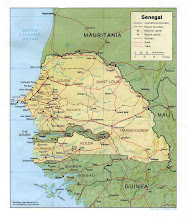This from the U.N., seeking to promote solar energy:
DAKAR, 8 October 2008 (IRIN) - Investing in solar energy could bring electricity to millions of Senegalese, significantly reduce electricity bills in the long term, and attract millions of dollars in development funding under the UN-brokered Clean Development Mechanism, says the UN, but only if investors step in.
Spiralling fuel costs, with oil prices at US$90 a barrel increase the urgency to go solar. “If you reduce these [fuel] oil import costs,” said Nick Nuttall, spokesperson for the UN Environment Programme in Nairobi, “it will do a tremendous amount to save money for government investment in schools, hospitals and other development activities to help the poor.”
Just one in four Senegalese has access to mains electricity, according to the UN, and the national electricity company, Senelec, struggles to meet even this demand.
Faced with a five-fold increase in its fuel bill between 2005 and 2008, Louis Seck, head of Senegal’s Renewable Energy Department, said Senegal not only wants to, but must now invest in renewables.
Senegal, like many of its Sahelian neighbours, gets 3,000 hours of sunshine a year at an intensity of 5.8 Watt hours per square metre (Wh/m2) per day. Solar power stations can be set up on uncultivable land, making Senegal “an ideal location for solar energy development”, said Nuttall.
Abdoulaye Fall, head of environmental quality and safety at the National Confederation of Employers in Senegal (CNES), said solar power could save money in the long term. While it currently costs about US$18.40 to produce one kilowatt hour of electricity using diesel, according to Seck, energy created at giant solar power plants could cost as little as half of this.
There are environmental and health benefits to solar energy, according to German aid agency GTZ. On top of reducing global greenhouse gas emissions it would make rural Senegalese, almost all of whom use firewood or charcoal for cooking, less dependent on these “dirty fuels” which can lead to respiratory diseases, a cause of infant mortality.
Moreover, the carbon emissions market makes investing in solar power a draw for wider sustainable development projects. Senegal hosted Africa’s first carbon forum in September 2008 hoping to attract investors seeking a higher greenhouse emission allowance than permitted by the Kyoto Protocol to fund renewable energy projects in Senegal as part of the Clean Development Mechanism. At the end of the week-long forum, 25 projects had found funders.
GTZ is working with the Senegalese Agency for Rural Electrification (ASER) to provide villages with photovoltaic panels, aiming to bring electricity to 60 percent of the targeted populations within three years.
But only one renewable energy scheme of any size exists in Senegal: an HEP station at the Manantali dam on the River Senegal, which has been supplying power to Senegal, Mali and Mauritania since 2002.
To set up more schemes of this size the government needs more cash. It has not been easy to attract private investors at anywhere near a large enough scale, according to the CNES’s Fall, because Senegal is still seen to be a risky place to invest, and the government provides little to no information for investors on risks and opportunities, he said.
GTZ coordinator Mansour Assani Dahouenon agreed. “The challenges for investors in renewable energies are the lack of a regulatory framework, and of incentives to investors,” he said.
Legislators from across West Africa came together in Ghana in late September 2008 to urge regional leaders to form a West African Renewable Energy Community to promote renewable energy projects. They also agreed to push leaders across the Economic Community of West African States (ECOWAS) to pass stronger laws to protect investors in renewable energy schemes.
Fall suggests in the meantime the Senegalese government should form a public-private partnership agency to regulate the renewable energies market, and should agree to back up big financing projects to reassure investors. Only then, he says, will solar power be affordable on a mass scale.
Subscribe to:
Post Comments (Atom)



No comments:
Post a Comment